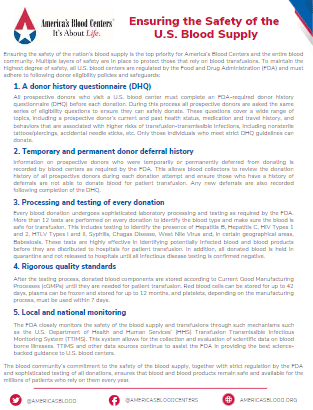To reach as many impacted donors as possible, America’s Blood Centers is asking Congress to provide targeted federal funding that can be used locally by blood centers to amplify their education and awareness efforts.
The Food and Drug Administration (FDA) initially instituted a lifetime deferral on blood donations from gay and bisexual men in 1983 to reduce the chance of HIV in the blood supply at a time when testing was limited or non-existent.
This move was perceived by many as inconsistent because gay and bisexual men were permanently deferred while individuals who had other HIV risks are deferred for one year after the event. The inconsistency led gay rights advocacy groups, many of them campus-based, to protest the lifetime donor deferral policy.
Other groups excluded from giving blood under the HIV deferral criteria include those born in sub-Saharan Africa and those who have ever used intravenous drugs, along with individuals who have exchanged money for sex.
In 2015, the FDA revised its policy and moved to a 12-month deferral in response to comprehensive testing and data demonstrating safety in shortened deferral. America’s Blood Centers proposed changing this deferral from the lifetime deferral to one year in 2000, saying it would not increase the risk of HIV infection in the blood supply.
The FDA changed its policy in 2020, reducing the donor deferral period from 12 to three months for gay and bisexual men. This change was made during a time when the COVID pandemic was straining our nation’s blood supply. America's Blood Centers strongly supported this change.
The “Assessing Donor Variability And New Concepts in Eligibility” (ADVANCE) Study began in 2020. It was a pilot study funded by the FDA that focused on the blood donor deferral policy for gay and bisexual men. Three blood collection organizations, including ABC-members OneBlood and Vitalant, collaborated with LGBTQ community centers and organizations in eight U.S. locations to enroll participants.
The study, which concluded in December, sought to determine if different eligibility criteria could be used at blood centers nationwide that focuses on each donor’s individual assessment rather than their sexual orientation.
In January of 2023, FDA released draft guidance, reflecting the scientific data gathered as part of the ADVANCE Study, that would establish blood donor screening based on individual donor assessments, not sexual orientation. ABC strongly supported this move.
A final guidance followed in May 2023, and blood centers are already working to welcome previously deferred donors as quickly as possible. Those interested in donating blood are encouraged to contact their local blood center to learn more about their implementation timeline.
Work has already begun across the blood community to welcome newly eligible donors, a process that will take time. While the FDA accepted updates to the donor history questionnaire in line with this final guidance, it still needs to validate computer systems regulated by the FDA. It is also important to note that each blood center will have their own timeframe for implementation, and donors are encouraged to contact their local blood center directly for more details.
While blood centers are already working with community organizations such as LGBTQ+ organizations, these efforts are constrained by a lack of funding.
Federal funding directed locally has shown to generate significant results in the recruitment of first-time and repeat blood donors. During the collection of COVID-19 Convalescent Plasma (CCP), funding was provided through an Other Transaction Authority (OTA) to increase the total number of CCP collections. America’s Blood Centers (ABC) managed the program and distributed funds to 37 not-for-profit blood centers, resulting in a 244% increase in CCP collection in a 20 week period, ensuring CCP was available for patient needs during the delta wave of COVID-19 when few therapeutics were available.
The blood and LGBTQ+ communities recently came together for a historic session at the ABC Annual Meeting, Connecting Communities: Working Collaboratively to Welcome Back LGBTQ Donors. Learn more about this collaboration in the video below.

Ensuring the safety of the nation’s blood supply is the top priority for America’s Blood Centers and the entire blood community. Learn more about the multiple layers of safety that are in place to protect those that rely on blood transfusions.
All U.S. blood centers are regulated by the Food and Drug Administration (FDA) and must adhere to their donor eligibility policies.
When FDA changes to donor eligibility occur, blood centers must undertake extensive changes before welcoming back impacted donors:
Latest Research
The Human Rights Campaign Foundation has released data detailing the LGBTQ+ community's views of the current deferral policy and the view of the FDA's move toward an individual donor assessment.
Latest Resources
ABC members get exclusive access to Collaborate, a community where you are able to share ideas, discuss topics, search for resources including talking points, one-pagers, webinars, and more on this and other topics.
Letters and Comments
View the latest letters and comments from ABC as we work to advance our advocacy agenda, strengthen the blood supply, and support the important role of community blood centers across the nation.

2024 Advocacy Agenda
Promoting the value of blood to patients, communities, and the healthcare system.
America’s Blood Centers and our members are committed to addressing the challenges facing community blood centers that ensure a safe and available blood supply is always available to meet patient needs.
Through our Advocacy Agenda, America’s Blood Centers urges the Administration, Congress, and industry stakeholders to promote the value of blood to patients, communities, and the healthcare system.
